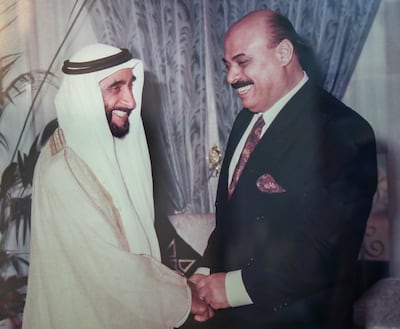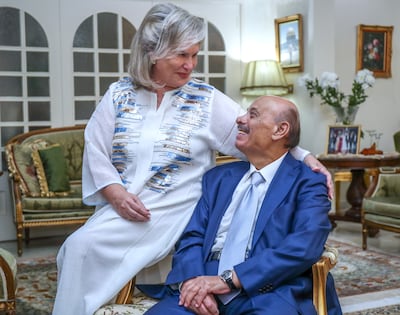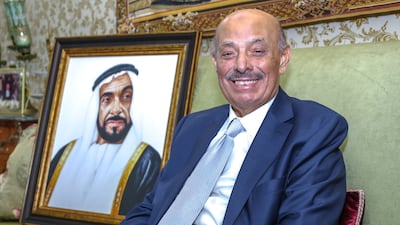Live updates: Follow the latest news on Israel-Gaza
The UAE’s relationship with Palestine and its people runs deep.
Spearheaded by the visionary leadership of UAE Founding Father, the late Sheikh Zayed bin Sultan Al Nahyan, the Emirates was one of the first countries to formally recognise Palestine as an independent state, marking the start of a close-knit relationship that would span decades.
Elevating this connection, Sheikh Zayed assigned a plot of land in Abu Dhabi for a Palestinian embassy.
The appointment of the UAE’s first Palestinian ambassador in 1989 solidified a bridge of cultural exchange and mutual respect between the two nations.
Beyond diplomatic gestures, the integration of Palestinians within the UAE community remains a tangible manifestation of the profound friendship shared between the two peoples.
This relationship was tested but ultimately reinforced during the Iraq invasion of Kuwait in August 1990.
When the Palestinian Liberation Organisation (PLO) supported Iraq, leading to the expulsion of more than 350,000 Palestinians from Kuwait, the UAE stood resolute in safeguarding the rights and presence of every Palestinian within its borders – despite joining the coalition to liberate Kuwait.
Standing together
Over the past two weeks, the enduring solidarity between Emiratis and Palestinians has shone through again as thousands of UAE residents gathered to collect aid for the people of Gaza currently under siege from Israeli air strikes.
While the UAE’s leadership is working to bring in a ceasefire on a diplomatic level, the nation also seeks to support the Palestinian people from a humanitarian perspective – in keeping with the country’s ethos of promoting peace and unity.
Palestine's first ambassador to the UAE, Khalid Malak, 83, and his wife Nawal, spoke to The National to reflect on a long-standing friendship.
Mr Malak was born in the city of Akka, now known as Acre, eight years before the Nakba when more than 700,000 Palestinians were forcibly displaced by Zionist paramilitary groups during the establishment of the state of Israel.
He moved to Lebanon when he was eight and where he later became head of the UNRWA school for girls and volunteered for the PLO.
Following the Sabra and Shatila massacre in 1982, Mr Malak moved to the UAE with his wife and children after a brief stint in Cyprus and Zanzibar.
There, he struck up a friendship with Sheikh Zayed that would endure until the Founding Father’s passing in 2004.
“I felt like the spoilt son of Zayed,” Mr Malak said.
In the late 1980s, Mr Malak was appointed head of the UAE’s PLO office by the group’s leader Yasser Arafat, known as Abu Ammar. Six years later, Palestine was declared an independent state and the PLO office became the Palestinian embassy with Mr Malak as the first ambassador.
Compassionate vision

“Sheikh Zayed loved Palestine and Palestine lived within him. He gave it what nobody in the world has given it and I am witness to that. Whatever we say about him will not do him justice,” said Mr Malak, who is now settled with his family in Abu Dhabi.
“Sheikh Zayed supported us in every way possible. He cared about our education, health and every part of our lives. Palestine lived within him, in his mind, his heart and conscience.”
Palestinians who moved to the UAE with only travel documents were welcomed with open arms by Sheikh Zayed, Mr Malak said.
Mrs Malak said: “His vision was always to support everyone regardless of whether they were Palestinians or Lebanese or any nationality. Education and supporting people was important to him, which is why he was always at every school opening and graduation.”
This was a vision he shared with his wife Sheikha Fatima, the Mother of the Nation.
"I don't think there was single moment where Sheikh Fatima didn't support Palestine whether it is through providing aid or even emotionally," Mrs Malak said.
"She supported exhibitions, campaigns, cultural events and covered the cost of treatment of Palestinians injured during the second intifada and many more.
"The continuous support of the Emirates Red Crescent under Sheikh Hamdan and his wife Sheikha Shamsa has made, and is as we speak, continuing to make a significant difference not only in Palestine but in many parts of the world."

Sheikha Fatima was the first to welcome the mother of 12-year-old Muhammad Al Durrah, who was killed alongside his father on September 2002 during Palestine's second intifada.
Mr Malak said one of the most challenging periods of his tenure was Iraq’s invasion of Kuwait, during which the UAE and Palestine stood in support of opposing sides.
The PLO’s decision to support Iraqi President Saddam Hussein against Kuwait, where hundreds of thousands of Palestinians had lived for years, led to an exodus from the country.
Mr Malak said that, at the time, Mr Arafat told him he felt compelled to stand with Iraq because “Saddam was temperamental”.
“‘If you are not with him, then he would take it as if you were against him. He has no middle ground," Mr Arafat told him. “We tried to convince him to pull his troops out but didn’t want to attack him out of fear that he would have all the Palestinians deported [from Iraq].”
Sheikh Zayed's unflinching support
Sheikh Zayed immediately summoned Mr Malak to his palace.
“‘How can you support an oppressor over the oppressed?’ Sheikh Zayed asked. ‘You are an occupied nation who have been oppressed yourself.’ I told him we weren’t with Saddam but didn’t want to issue an official statement,” Mr Malak said.
The words that followed from Sheikh Zayed are ones that Mr Malak says he will never forget.
“'I know that the entire Palestine leadership are with Saddam, but I stand by the Palestinian people’, he said."
The UAE did not deport any Palestinians, choosing not to punish the people for their government’s decisions.
“I don’t think there is a single person who doesn’t kneel for prayer without praying for Zayed. What he gave me and my family is like nobody has even given me, including Abu Ammar,” said Mr Malak.
“At the time I swore that if a single Palestinian even so much as got a traffic ticket, I would resign my post.
“This man ... built entire cities, hospitals, schools, universities and mosques, which his sons later inaugurated. His prints are in every area of Palestine.”
Today, President Sheikh Mohamed and the leadership carry on this legacy.
Earlier this month, Sheikh Mohamed directed $20 million in aid for the Palestinian people.
He has also held talks with a number of world leaders since the start of the conflict, to call for civilian lives to be protected, crucial aid to be delivered and to reiterate the need for a ceasefire.
“The events today are heart-breaking,” said Mr Malak of the war on Gaza.
“Seeing all the young children, women and innocent civilians being massacred. Our hearts are breaking. People are dying not in hundreds but in thousands.
“We hope it stops – for the sake of the innocent civilians on both sides.”

